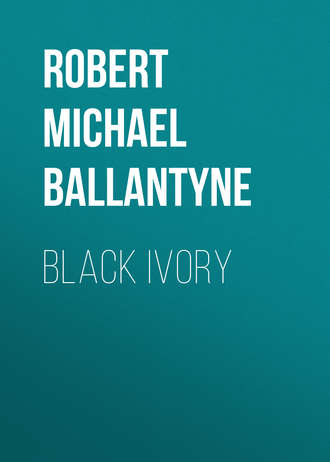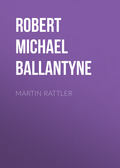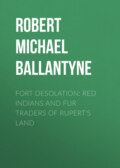
Robert Michael Ballantyne
Black Ivory
Chapter Twenty.
Harold Appears in a New Character, and Two Old Characters Reappear to Harold
The mind of Yambo was a strange compound—a curious mixture of gravity and rollicking joviality; at one time displaying a phase of intense solemnity; at another exhibiting quiet pleasantry and humour, but earnestness was the prevailing trait of his character. Whether indulging his passionate fondness for the jumping-jack, or engaged in guiding the deliberations of his counsellors, the earnest chief was equally devoted to the work in hand. Being a savage—and, consequently, led entirely by feeling, which is perhaps the chief characteristic of savage, as distinguished from civilised, man,—he hated his enemies with exceeding bitterness, and loved his friends with all his heart.
Yambo was very tender to Harold during his illness, and the latter felt corresponding gratitude, so that there sprang up between the two a closer friendship than one could have supposed to be possible, considering that they were so different from each other, mentally, physically, and socially, and that their only mode of exchanging ideas was through the medium of a very incompetent interpreter.
Among other things Harold discovered that his friend the chief was extremely fond of anecdotes and stories. He, therefore, while in a convalescent state and unable for much physical exercise, amused himself, and spent much of his time, in narrating to him the adventures of Robinson Crusoe. Yambo’s appetite for mental food increased, and when Crusoe’s tale was finished he eagerly demanded more. Some of his warriors also came to hear, and at last the hut was unable to contain the audiences that wished to enter. Harold, therefore, removed to an open space under a banyan-tree, and there daily, for several hours, related all the tales and narratives with which he was acquainted, to the hundreds of open-eyed and open-mouthed negroes who squatted around him.
At first he selected such tales as he thought would be likely to amuse, but these being soon exhausted, he told them about anything that chanced to recur to his memory. Then, finding that their power to swallow the marvellous was somewhat crocodilish, he gave them Jack the Giant-killer, and Jack of Beanstalk notoriety, and Tom Thumb, Cinderella, etcetera, until his entire nursery stock was exhausted, after which he fell back on his inventive powers; but the labour of this last effort proving very considerable, and the results not being adequately great, he took to history, and told them stories about William Tell, and Wallace, and Bruce, and the Puritans of England, and the Scottish Covenanters, and the discoveries of Columbus, until the eyes and mouths of his black auditors were held so constantly and widely on the stretch, that Disco began to fear they would become gradually incapable of being shut, and he entertained a fear that poor Antonio’s tongue would, ere long, be dried up at the roots.
At last a thought occurred to our hero, which he promulgated to Disco one morning as they were seated at breakfast on the floor of their hut.
“It seems to me, Disco,” he said, after a prolonged silence, during which they had been busily engaged with their knives and wooden spoons, “that illness must be sent sometimes, to teach men that they give too little of their thoughts to the future world.”
“Werry true, sir,” replied Disco, in that quiet matter-of-course tone with which men generally receive axiomatic verities; “we is raither given to be swallered up with this world, which ain’t surprisin’ neither, seein’ that we’ve bin putt into it, and are surrounded by it, mixed up with it, steeped in it, so to speak, an’ can’t werry well help ourselves.”
“That last is just the point I’m not quite so sure about,” rejoined Harold. “Since I’ve been lying ill here, I have thought a good deal about forgetting to bring a Bible with me, and about the meaning of the term Christian, which name I bear; and yet I can’t, when I look honestly at it, see that I do much to deserve the name.”
“Well, I don’t quite see that, sir,” said Disco, with an argumentative curl of his right eyebrow; “you doesn’t swear, or drink, or steal, or commit murder, an’ a many other things o’ that sort. Ain’t that the result o’ your being a Christian.”
“It may be so, Disco, but that is only what may be styled the don’t side of the question. What troubles me is, that I don’t see much on the do side of it.”
“You says your prayers, sir, don’t you?” asked Disco, with the air of a man who had put a telling question.
“Well, yes,” replied Harold; “but what troubles me is that, while in my creed I profess to think the salvation of souls is of such vital importance, in my practice I seem to say that it is of no importance at all, for here have I been, for many weeks, amongst these black fellows, and have never so much as mentioned the name of our Saviour to them, although I have been telling them no end of stories of all kinds, both true and fanciful.”
“There’s something in that sir,” admitted Disco. Harold also thought there was so much in it that he gave the subject a great deal of earnest consideration, and finally resolved to begin to tell the negroes Bible stories. He was thus gradually led to tell them that “old, old story” of God the Saviour’s life and death, and love for man, which he found interested, affected, and influenced the savages far more powerfully than any of the tales, whether true or fanciful, with which he had previously entertained them. While doing this a new spirit seemed to actuate himself, and to influence his whole being.
While Harold was thus led, almost unconsciously, to become a sower of the blessed seed of God’s Word, Marizano was working his way through the country, setting forth, in the most extreme manner, the ultimate results of man’s sinful nature, and the devil’s lies.
One of his first deeds was to visit a village which was beautifully situated on the banks of a small but deep river. In order to avoid alarming the inhabitants, he approached it with only about thirty of his men, twenty of whom were armed. Arrived at the outskirts, he halted his armed men, and advanced with the other ten, calling out cheerfully, “We have things for sale! have you anything to sell?” The chief and his warriors, armed with their bows and arrows and shields, met him, and forbade him to pass within the hedge that encircled the village, but told him to sit down under a tree outside. A mat of split reeds was placed for Marizano to sit on; and when he had explained to the chief that the object of his visit was to trade with him for ivory—in proof of which he pointed to the bales which his men carried,—he was well received, and a great clapping of hands ensued. Presents were then exchanged, and more clapping of hands took place, for this was considered the appropriate ceremony. The chief and his warriors, on sitting down before Marizano and his men, clapped their hands together, and continued slapping on their thighs while handing their presents, or when receiving those of their visitors. It was the African “thank you.” To have omitted it would have been considered very bad manners.
Soon a brisk trade was commenced, in which the entire community became ere long deeply and eagerly absorbed.
Meanwhile Marizano’s armed men were allowed to come forward. The women prepared food for the strangers; and after they had eaten and drunk of the native beer heartily, Marizano asked the chief if he had ever seen fire-arms used.
“Yes,” replied the chief, “but only once at a great distance off. It is told to me that your guns kill very far off—much further than our bows. Is that so?”
“It is true,” replied Marizano, who was very merry by this time under the influence of the beer, as, indeed, were also his men and their entertainers. “Would you like to see what our guns can do?” asked the half-caste. “If you will permit me, I shall let you hear and see them in use.”
The unsuspecting chief at once gave his consent. His visitors rose; Marizano gave the word; a volley was poured forth which instantly killed the chief and twenty of his men. The survivors fled in horror. The young women and children were seized; the village was sacked—which means that the old and useless members of the community were murdered in cold blood, and the place was set on fire—and Marizano marched away with his band of captives considerably augmented, leaving a scene of death and horrible desolation behind him.
Thus did that villain walk through the land with fire and sword procuring slaves for the supply of the “domestic institution” of the Sultan of Zanzibar.
By degrees the murderer’s drove of black “cattle” increased to such an extent that when he approached the neighbourhood of the village in which Harold and Disco sojourned, he began to think that he had obtained about as many as he could conveniently manage, and meditated turning his face eastward, little dreaming how near he was to a thousand dollars’ worth of property, in the shape of ransom for two white men!
He was on the point of turning back and missing this when he chanced to fall in with a villager who was out hunting, and who, after a hot chase, was captured. This man was made much of, and presented with some yards of cloth as well as a few beads, at the same time being assured that he had nothing to fear; that the party was merely a slave-trading one; that the number of slaves required had been made up, but that a few more would be purchased if the chief of his village had any to dispose of.
On learning from the man that his village was a large one, fully two days’ march from the spot where he stood, and filled with armed men, Marizano came to the conclusion that it would not be worth his while to proceed thither, and was about to order his informant to be added to his gang with a slave-stick round his neck, when he suddenly bethought him of inquiring as to whether any white men had been seen in these parts. As he had often made the same inquiry before without obtaining any satisfactory answer, it was with great surprise that he now heard from his captive of two white men being in the very village about which he had been conversing.
At once he changed his plan, resumed his march, and, a couple of days afterwards, presented himself before the astonished eyes of Harold Seadrift and Disco Lillihammer, while they were taking a walk about a mile from the village.
Disco recognised the slave-trader at once, and, from the troubled as well as surprised look of Marizano, it was pretty evident that he remembered the countenance of Disco.
When the recollection of Marizano’s cruelty at the time of their first meeting flashed upon him, Disco felt an almost irresistible desire to rush upon and strangle the Portuguese, but the calm deportment of that wily man, and the peaceful manner in which he had approached, partly disarmed his wrath. He could not however, quite restrain his tongue.
“Ha!” said he, “you are the blackguard that we met and pretty nigh shot when we first came to these parts, eh? Pity we missed you, you black-hearted villain!”
As Marizano did not understand English, these complimentary remarks were lost on him. He seemed, however, to comprehend the drift of them, for he returned Disco’s frown with a stare of defiance.
“Whatever he was, or whatever he is,” interposed Harold, “we must restrain ourselves just now, Disco, because we cannot punish him as he deserves, however much we may wish to, and he seems to have armed men enough to put us and our entertainers completely in his power. Keep quiet while I speak to him.”
Jumbo and Antonio, armed with bows and arrows,—for they were in search of small game wherewith to supply the pot—came up, looking very much surprised, and the latter a good deal frightened.
“Ask him, Antonio,” said Harold, “what is his object in visiting this part of the country.”
“To procure slaves,” said Marizano, curtly.
“I thought so,” returned Harold; “but he will find that the men of this tribe are not easily overcome.”
“I do not wish to overcome them,” said the half-caste. “I have procured enough of slaves, as you see,” (pointing to the gang which was halted some hundred yards or so in rear of his armed men), “but I heard that you were prisoners here, and I have come to prove to you that even a slave-trader can return good for evil. You did this,” he said, looking at Disco, and pointing to his old wound in the arm; “I now come to deliver you from slavery.”
Having suppressed part of the truth, and supplemented the rest of it with this magnificent lie, Marizano endeavoured to look magnanimous.
“I don’t believe a word of it,” said Disco, decidedly.
“I incline to doubt it too,” said Harold; “but he may have some good reason of his own for his friendly professions towards us. In any case we have no resource left but to assume that he speaks the truth.”
Turning to Marizano, he said:—
“We are not prisoners here. We are guests of the chief of this village.”
“In that case,” replied the half-caste, “I can return to the coast without you.”
As he said this a large band of the villagers, having discovered that strangers had arrived, drew near. Marizano at once advanced, making peaceful demonstrations, and, after the requisite amount of clapping of hands on both sides, stated the object for which he had come. He made no attempt to conceal the fact that he was a slave-trader, but said that, having purchased enough of slaves, he had visited their village because of certain rumours to the effect that some white men had been lost in these regions, and could not find their way back to the coast. He was anxious, he said, to help these white men to do so, but, finding that the white men then at the village were not the men he was in search of, and did not want to go to the coast, he would just stay long enough with the chief to exchange compliments, and then depart.
All this was translated to the white men in question by their faithful ally Antonio, and when they retired to consult as to what should be done, they looked at each other with half amused and half perplexed expressions of countenance.
“Werry odd,” said Disco, “how contrairy things turns up at times!”
“Very odd indeed,” assented Harold, laughing. “It is quite true that we are, in one sense, lost and utterly unable to undertake a journey through this country without men, means, or arms; and nothing could be more fortunate than that we should have the chance, thus suddenly thrown in our way, of travelling under the escort of a band of armed men; nevertheless, I cannot bear the idea of travelling with or being indebted to a slave-trader and a scoundrel like Marizano.”
“That’s w’ere it is, sir,” said Disco with emphasis, “I could stand anything a’most but that.”
“And yet,” pursued Harold, “it is our only chance. I see quite well that we may remain for years here without again having such an opportunity or such an escort thrown in our way.”
“There’s no help for it, I fear,” said Disco. “We must take it like a dose o’ nasty physic—hold our nobs, shut our daylights, an’ down with it. The only thing I ain’t sure of is your ability to travel. You ain’t strong yet.”
“Oh, I’m strong enough now, or very nearly so, and getting stronger every day. Well, then, I suppose it’s settled that we go?”
“Humph! I’m agreeable, an’ the whole business werry disagreeable,” said Disco, making a wry face.
Marizano was much pleased when the decision of the white men was made known to him, and the native chief was naturally much distressed, for, not only was he about to lose two men of whom he had become very fond, but he was on the point of being bereft of his story-teller, the opener up of his mind, the man who, above all others, had taught him to think about his Maker and a future state.
He had sense enough, however, to perceive that his guests could not choose but avail themselves of so good an opportunity, and, after the first feeling of regret was over, made up his mind to the separation.
Next day Harold and Disco, with feelings of strong revulsion, almost of shame, fell into the ranks of the slave-gang, and for many days thereafter marched through the land in company with Marizano and his band of lawless villains.
Marizano usually walked some distance ahead of the main body with a few trusty comrades. Our adventurers, with their two followers, came next in order of march, the gang of slaves in single file followed, and the armed men brought up the rear. It was necessarily a very long line, and at a distance resembled some hideous reptile crawling slowly and tortuously through the fair fields and plains of Africa.
At first there were no stragglers, for the slaves were as yet, with few exceptions, strong and vigorous. These exceptions, and the lazy, were easily kept in the line by means of rope and chain, as well as the rod and lash.
Harold and Disco studiously avoided their leader during the march. Marizano fell in with their humour and left them to themselves. At nights they made their own fire and cooked their own supper, as far removed from the slave camp as was consistent with safety, for they could not bear to witness the sufferings of the slaves, or to look upon their captors. Even the food that they were constrained to eat appeared to have a tendency to choke them, and altogether their situation became so terrible that they several times almost formed the desperate resolution of leaving the party and trying to reach the coast by themselves as they best might, but the utter madness and hopelessness of such a project soon forced itself on their minds, and insured its being finally abandoned.
One morning Marizano threw off his usual reserve, and, approaching the white men, told them that in two hours they would reach the lake where his employer was encamped.
“And who is your master?” asked Harold.
“A black-faced or yellow-faced blackguard like himself, I doubt not,” growled Disco.
Antonio put Harold’s question without Disco’s comment, and Marizano replied that his master was an Arab trader, and added that he would push on in advance of the party and inform him of their approach.
Soon afterwards the lake was reached. A large dhow was in readiness, the gang was embarked and ferried across to a place where several rude buildings and barracoons, with a few tents, indicated that it was one of the inland headquarters of the trade in Black Ivory.
The moment our travellers landed Marizano led them to one of the nearest buildings, and introduced them to his master.
“Yoosoof!” exclaimed Disco in a shout of astonishment.
It would have been a difficult question to have decided which of the three faces displayed the most extreme surprise. Perhaps Disco’s would have been awarded the palm, but Yoosoof was undoubtedly the first to regain his self-possession.
“You be surprised,” he said, in his very broken English, while his pale-yellow visage resumed its placid gravity of expression.
“Undoubtedly we are,” said Harold.
“Bu’stin’!” exclaimed Disco.
“You would be not so mush surprised,—did you know dat I comes to here every year, an’ dat Engleesh consul ask me for ’quire about you.”
“If that be so, how comes it that you were surprised to see us?” asked Harold.
“’Cause why, I only knows dat some white mans be loss theirselfs—not knows what mans—not knows it was you.”
“Well now,” cried Disco, unable to restrain himself as he turned to Harold, “did ever two unfortnits meet wi’ sitch luck? Here have we bin’ obliged for days to keep company with the greatest Portugee villian in the country, an’ now we’re needcessitated to be under a obligation to the greatest Arab scoundrel in Afriky.”
The scoundrel in question smiled and shrugged his shoulders.
“Yoosoof,” cried Disco, clenching his fist and looking full in the trader’s eyes, “when I last saw yer ugly face, I vowed that if ever I seed it again I’d leave my mark on it pretty deep, I did; and now I does see it again, but I haven’t the moral courage to touch sitch a poor, pitiful, shrivelled-up package o’ bones an’ half-tanned leather. Moreover, I’m goin’ to be indebted to ’ee! Ha! ha!” (he laughed bitterly, and with a dash of wild humour in the tone), “to travel under yer care, an’ eat yer accursed bread, and—and—oh! there ain’t no sitch thing as shame left in my corpus. I’m a low mean-spirited boastful idiot, that’s wot I am, an’ I don’t care the fag-end of a hunk o’ gingerbread who knows it.”
After this explosion the sorely tried mariner brought his right hand down on his thigh with a tremendous crack, turned about and walked away to cool himself.







